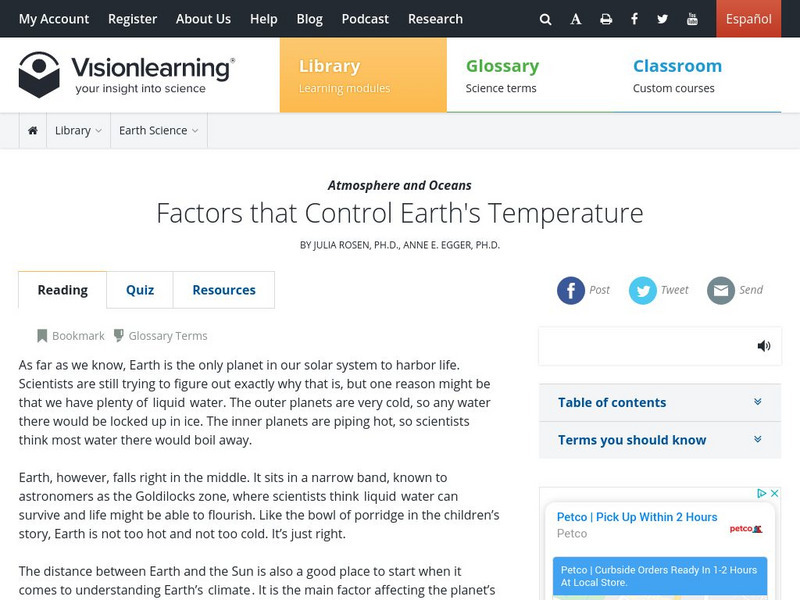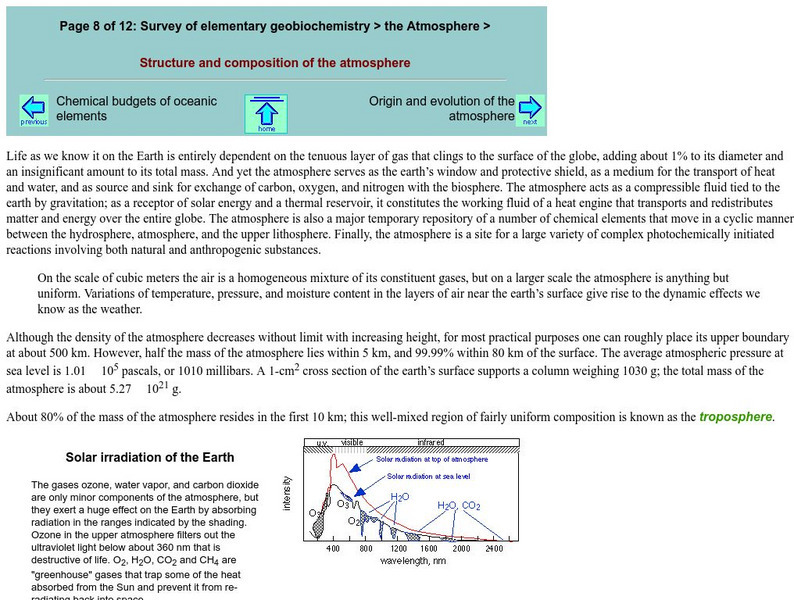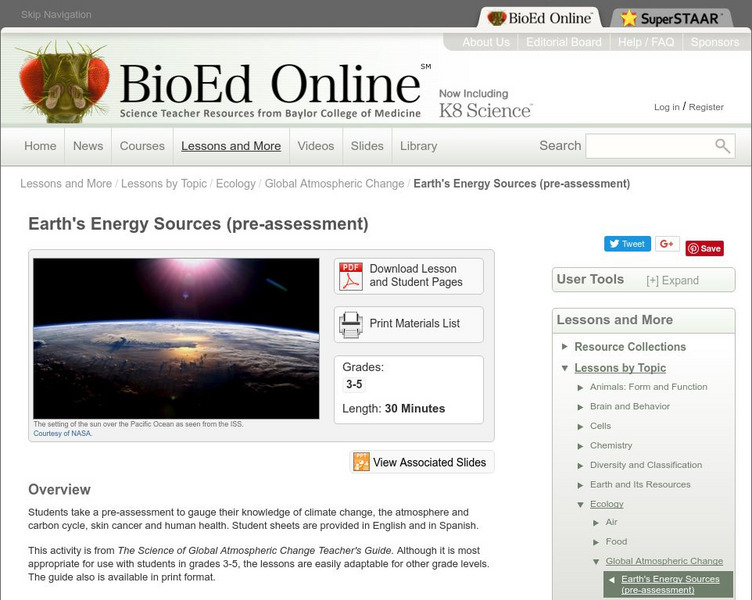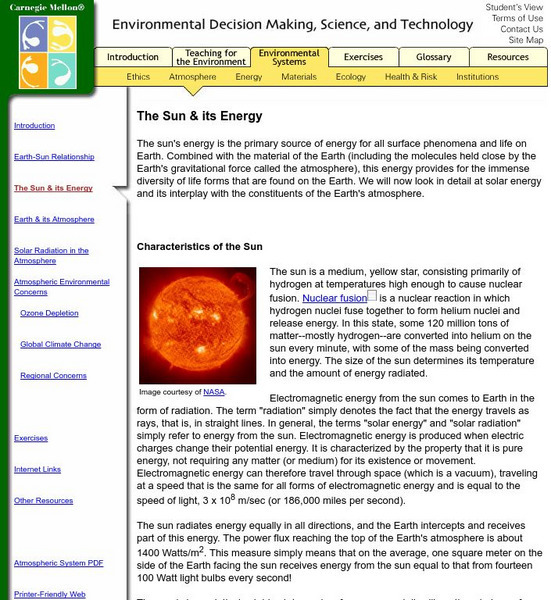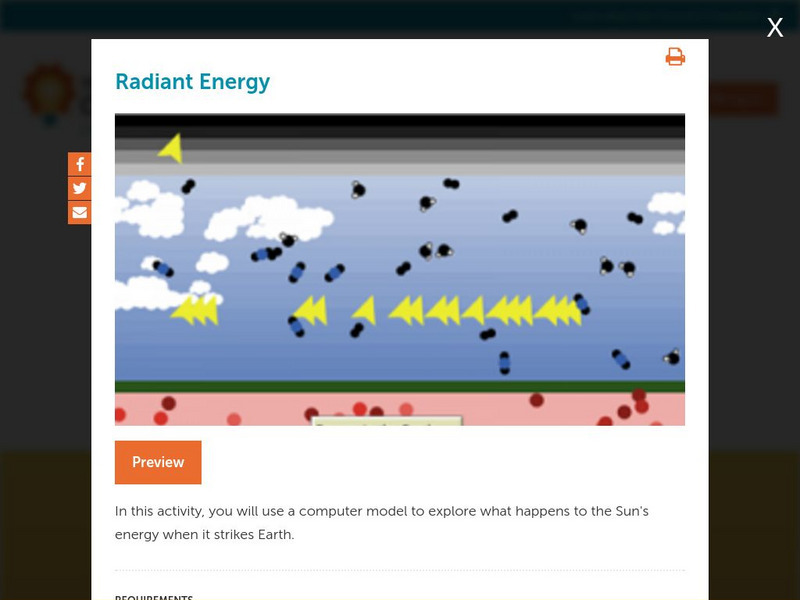Hi, what do you want to do?
Curated OER
Using My Nasa Data To Determine Volcanic Activity
Students use NASA satellite data of optical depth as a tool to determine volcanic activity on Reunion Island during 2000-2001. They access the data and utilize Excel to create a graph that has optical depth as a function of time for the...
Curated OER
Weather Patterns
Students use yearly averages over a five-year period to understand weather trends for a specific area.
Curated OER
Cloud Shadows
Students classify clouds as transparent, translucent or opaque. They conduct an experiment to determine the visual opacity of several classroom objects and then conduct further observations of clouds.
Curated OER
Cloud Databases
Students complete a unit on clouds and a report about one type of cloud. They collect data through observation about different types of cloud cover and then create a spreadsheet to reflect their observations over a 2 week period.
Curated OER
Super Scientists Code
In this science worksheet, students use the key code on the right to unscramble each of the scientists. They also match each of the scientists found to their correct description.
Curated OER
Day and Night
Students using experiments try to demonstrate how observations can be affected by the cycles of night and day.
Curated OER
What is Ride Sharing?
Third graders discover the concept of ride sharing. They discuss how it helps the environment. They use the internet to gather information as well.
Curated OER
Water Cycle
Students identify and define evaporation, condensation, precipitation and also, how these interact to complete the water cycle. They identify that water moves in a contimuous cycle, which is powered by the sun. Finally, students name...
Vision Learning
Visionlearning: Atmosphere and Oceans: Factors That Control Earth's Temperature
An explanation of how temperature is affected by the composition of the atmosphere and how energy flows in and out of Earth's atmosphere.
National Geographic
National Geographic: Interactions Within Earth's Atmospheres
Using computational models, students investigate the interaction between greenhouse gases, solar radiation, and the Earth's surface for the impact on climate. They then look at data on atmospheric carbon dioxide to analyze changes in...
Indiana University
Indiana Univ.: Global Energy Transfer, Atmosphere and Ocean Circulation, Climate
A course lecture on the external processes that shape the Earth, specifically the hydrologic system. This system is powered by the Sun's energy. The components of the Earth's energy budget are described, and how these drive the movement...
Simon Fraser University
Chem1 Virtual Textbook: Structure and Composition of the Atmosphere
As part of the General Chemistry Virtual Textbook, this site examines a variety of topics related to Earth's atmosphere. Topics covered in the overview include structure of the atmosphere, composition of the atmosphere, energy balance of...
University Corporation for Atmospheric Research
Ucar: Introduction to the Atmosphere
A detailed overview of the Earth's atmosphere, with explanations about atmospheric properties, the structure of the atmosphere, its four layers, atmospheric processes, energy heat transfer, conduction and convection, and radiation. All...
Howard Hughes Medical Institute
Hhmi: Bio Interactive: Paleoclimate: A History of Change
Learn about the history of Earth's climate in this Click and Learn. Learn how many factor control Earth's climate. Specifically, examine two of the most important factors: solar radiation and the composition of Earth's atmosphere.
BioEd Online
Bio Ed Online: Earth's Energy Sources (Pre Assessment)
A pre-assessment at the beginning of a unit on global atmospheric change. It checks understanding of issues around climate change and the impact it has on the environment and on human health. The lesson and accompanying slideshow can...
TED Talks
Ted: Ted Ed: A Guide to the Energy of the Earth
Energy is neither created nor destroyed - and yet the global demand for it continues to increase. But where does energy come from, and where does it go? This video examines the many ways in which energy cycles through our planet, from...
Massachusetts Institute of Technology
Mit: Open Course Ware: Courses: Civil Environmental: Ecology I: The Earth System
College-level online course highlighting the fundamentals of ecology. Course topics include coevolution of the biosphere, geosphere, atmosphere, and hydrosphere; photosynthesis and respiration; and the carbon, nitrogen, and water cycles....
University Corporation for Atmospheric Research
Ucar: Atmospheric Science Explorers: Global Climate Change
A detailed overview of global climate change, with explanations of Earth's climate change, the carbon cycle, ecosystems, and greenhouse gases, and how the movements of matter and energy impact on climate. All information is reinforced...
CK-12 Foundation
Ck 12: Earth Science for Middle School
This digital textbook covers core earth science concepts and includes interactive features, real-world examples, videos, and study guides.
King's Centre for Visualization in Science
Explaining Climate Change: Lesson 4: Climate: A Balancing Act
How does the Earth's energy balance regulate climate? This is the fourth lesson in a series of learning modules on the topic of climate change. This lesson explores how different factors can impact the amount of energy that enters and...
Carnegie Mellon University
Telstar: The Sun and Its Energy
The sun's energy is the primary source of energy for all surface phenomena and life on Earth. Combined with the material of the Earth (including the molecules held close by the Earth's gravitational force called the atmosphere), this...
Carnegie Mellon University
The Sun and Its Energy
The sun's energy is the primary source of energy for all surface phenomena and life on Earth. Combined with the material of the Earth (including the molecules held close by the Earth's gravitational force called the atmosphere), this...
Concord Consortium
Concord Consortium: Stem Resources: Radiant Energy Flow
A virtual lab to look at the physical features of Earth that affect the amount of the Sun's energy that hits Earth. Students investigate how solar and infrared radiations enters and leaves the atmosphere with this model. Virtual lab...
NOAA
Noaa: The Ionosphere [Pdf]
SEC produced several articles to help teachers teach about space weather. This one covers the ionosphere. It covers the characteristics, variability, and scintillation of this layer of the atmosphere. PDF format.













